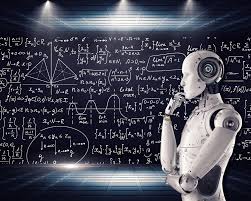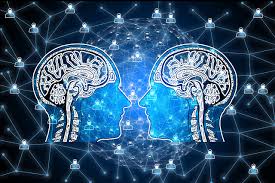Artificial Intelligence (AI) has become one of the most revolutionary technologies of the 21st century. From smartphones and chatbots to self-driving cars and advanced robotics, AI is transforming every industry. But what makes AI so powerful? The answer lies in intelligence in AI—the ability of machines to mimic human thinking, learning, and problem-solving.

In this blog, we will explore what intelligence in AI means, how it works, its types, applications, challenges, and future potential. If you are a student, tech enthusiast, or simply curious about the future of technology, this guide will help you understand AI in the simplest way possible.
What is intelligence in AI?
In simple terms, intelligence in AI refers to the capability of machines and computer systems to simulate human intelligence. Just like humans can learn from experience, analyze situations, and make decisions, AI systems are designed to do the same—but using algorithms, data, and computational power.

Key Features of AI Intelligence:
a. Learning: Ability to improve performance with experience (machine learning).
b. Reasoning: Making logical decisions using available data.
c. Understanding the environment through sensors, vision, or sound.
d. Problem-solving: Finding solutions just like humans do.
e. Adaptability: Adjusting to new situations without being reprogrammed.
Types of Intelligence in AI:
AI intelligence is often classified into different categories based on capability and functionality:
1. Artificial Narrow Intelligence (ANI)
a. Also called Weak AI.
b. Focuses on one specific task.
c. Example: Siri, Google Assistant, ChatGPT, and recommendation systems.
2. Artificial General Intelligence (AGI)
a. Also called strong AI.
b. Machines can perform any intellectual task that humans can.
c. Still theoretical, but research is ongoing.
d. Example: A robot that can cook, learn languages, and solve math problems like a human.
3. Artificial Superintelligence (ASI)
a. The future stage of AI where machines may surpass human intelligence.
b. Could potentially think, reason, and innovate better than humans.
c. Both exciting and risky.

How Intelligence in AI Works
To understand intelligence in AI, let us break it into key components:
1. Machine Learning (ML)
a. Teaches machines to learn from data.
b. Example: Netflix recommending shows based on your watch history.
2. Natural Language Processing (NLP)
a. Helps AI understand and process human language.
b. Example: Chatbots, translation apps, and voice assistants.
3. Computer Vision
a. Enables machines to see and analyze images or videos.
b. Example: Face recognition in smartphones, self-driving cars.
4. Neural Networks & Deep Learning
a. Inspired by the human brain.
b. Helps in recognizing patterns, speech, and complex data.
5. Reinforcement Learning
a. Machines learn by trial and error.
b. Example: AI playing chess or robots learning to walk.
Applications of Intelligence in AI
1. Healthcare
a. AI diagnoses diseases, predicts treatment success, and even assists in surgeries.
b. Example: AI analyzing X-rays for cancer detection.
2. Education
a. Personalized learning apps powered by AI.
b. Example: AI tutors helping students learn at their own pace.
3. Business and Finance
a. Fraud detection, customer service chatbots, predictive analytics.
b. Example: AI identifying unusual credit card transactions.
4. Transportation
a. Self-driving cars and smart traffic systems.
b. Example: Tesla’s autopilot system.
5. Smart Homes
a. Devices like Alexa, Google Home, and IoT gadgets.
b. Example: AI adjusting lights and temperature automatically.
6. Entertainment
a. AI in music, gaming, and content recommendations.
b. Example: Spotify suggesting songs you’ll love.

Advantages of Intelligence in AI
a. Efficiency: Handles repetitive tasks faster than humans.
b. Accuracy: Reduces human error in medicine, engineering, and data processing.
c. 24/7 Availability: Unlike humans, AI doesn’t get tired.
d. Data Handling: Can analyze massive amounts of data instantly.
c. Innovation: Helps create new tools, solutions, and possibilities.
Challenges of Intelligence
While AI intelligence has many benefits, it also comes with challenges:
a. Job Loss: Automation may replace certain jobs.
b. Ethical Issues: AI decision-making in sensitive areas like law or healthcare.
c. Bias in AI: If the data is biased, the AI results will also be biased.
d. Security Concerns: AI can be misused for hacking, deepfakes, and cybercrimes.
e. Dependency: Over-reliance on AI may reduce human critical thinking.
The Future of Intelligence in AI
a. AI is evolving rapidly, and the future looks both promising and challenging. Experts predict:
b. Smarter personal assistants that understand emotions.
c. AI in Space Exploration to help astronauts.
d. Medical AI that predicts diseases before symptoms appear.
e. Ethical AI Frameworks to ensure safe use.
f. Potential superintelligence that could reshape society.
g. The balance between innovation and ethics will decide how AI intelligence impacts humanity.
Frequently Asked Questions (FAQs) on Intelligence in AI
What is intelligence in AI?
Intelligence in AI is the ability of machines and systems to mimic human intelligence, including learning, reasoning, problem-solving, and decision-making, using algorithms and data.
What are the main types of AI intelligence?
The three types are:
Artificial Narrow Intelligence (ANI): Focused on one task (e.g., voice assistants).
Artificial General Intelligence (AGI): Human-level AI that can perform any intellectual task.
Artificial Superintelligence (ASI): Hypothetical future AI that surpasses human intelligence.
What are examples of intelligence in AI?
Examples include chatbots like ChatGPT, self-driving cars, AI in medical diagnosis, recommendation systems (Netflix, YouTube), and smart home devices like Alexa or Google Home.
What are the benefits of AI intelligence?
AI provides efficiency, accuracy, 24/7 availability, advanced data handling, and innovation. It reduces human error and helps industries work smarter.
What are the challenges of AI intelligence?
The main challenges include job automation, ethical concerns, algorithm bias, cybersecurity threats, and human over-reliance on AI systems.
Conclusion
Intelligence in AI is not just about machines being smart; it’s about creating tools that augment human abilities, solve real-world problems, and transform industries. From healthcare to education, business to space, AI intelligence is paving the way for a smarter future.
However, with great power comes responsibility. As we move toward artificial general intelligence and possibly superintelligence, society must ensure that AI is developed ethically, securely, and for the benefit of all.
In the end, intelligence in AI is the bridge between human creativity and machine power—and together, they can shape a better tomorrow.
